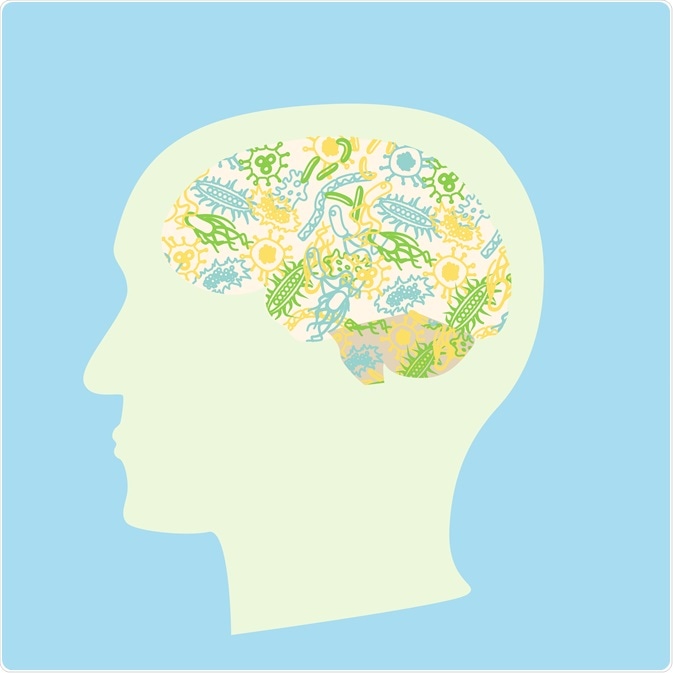The human gut harbors about 2.2 pounds of microbes, including bacteria, viruses, fungi, and protists.
 Image Credit: WhiteDragon / Shutterstock.com
Image Credit: WhiteDragon / Shutterstock.com
The combined total of these microbes is referred to as the gut microbiome, changes in which have been linked to a number of neurological and psychiatric conditions including depression, anxiety, Parkinson’s disease, Alzheimer’s disease, and multiple sclerosis.
The intestine is in constant communication with the brain, and the gut microbiome is an important contributor in this.
Two potential modes of communication have been proposed:
The intestinal microbiome makes neurotransmitters that are sent to the brain via the blood
Bacteria produce a variety of neurotransmitters, including serotonin, dopamine, and noradrenaline, as well as other molecules such as proinflammatory cytokines and fatty acids, all of which can access the bloodstream and get transported to the brain where they can influence brain function.
The vagus nerve plays a role in changing the expression of brain receptors
The second theory refers to a more direct mode of communication. The vagus nerve is the main nerve that connects the gut to the brain. One study showed that when certain types of bacteria are eliminated from the gut, the expression of certain receptors in the brain changed. However, when the vagus nerve was cut, the elimination of the bacteria did not change the expression of brain receptors. This finding indicates that the vagus nerve plays a role in carrying out the change.
What is known about the link between migraine and the gut microbiome?
One 2016 study published in mSystems, a journal of the American Society for Microbiology, found that people who suffer from migraines have more bacteria, especially in the mouth, that can make a gas called nitric oxide, which is known to be a migraine trigger. Despite the finding only being a correlation, it offers a potential explanation for why some people are more susceptible to migraines than others and why certain foods seem to trigger migraines.
First author Antoni Gonzalez from the University of California San Diego said the fact that there is a notion that certain foods such as chocolate and wine trigger migraines prompted the team to ask whether there is any association between the foods people eat, the microbiome and the migraines people experience.
When bacteria in the mouth and intestine break nitrates down, the nitrates are eventually converted to the gas nitric oxide, which is known to dilate blood vessels, boost circulation and therefore improve the health of cardiovascular patients.
However, in 80% of cases, when such patients take drugs that contain nitrates to relieve angina or to treat heart failure, they report migraine onset as a side effect. Consultant neurologist and trustee of the Migraine Trust, Brendan Davies, referred to the concept that the gut microbiome plays a role in migraine as medically plausible. He described a phenomenon called the “hot dog headache,” which is suspected to involve nitrates.
For the current study, Gonzalez and colleagues used high-throughput RNA sequencing technologies to assess bacteria taken from 172 oral samples and 1,996 feces samples. The samples were taken from healthy participants who had reported whether or not they experience migraines.
In both types of samples, the number of bacteria that process nitrates was slightly higher among people who suffered from migraines, compared with those who did not. Next, the researchers intend to study the effects of a controlled diet on migraine to test whether blood nitric oxide levels are associated with migraine attacks.
The largest study to examine the effects of probiotics on migraine
In a 2019 study published in the journal Cephalalgia, researchers described the largest ever trial of its kind examining the effects of probiotic supplementation on migraine.
The study found that probiotics significantly reduced the frequency and intensity of migraines, a finding that represents a major step towards understanding the role the microbiome plays in migraine.
Fifty participants suffering from chronic migraine or episodic migraine either received a placebo or a probiotic containing 14 strains of bacteria, including Bifidobacterium, Lactobacillus and Bacillus subtilis.
After taking the probiotic for 8 to 10 weeks, migraine attacks had significantly decreased among those who took the probiotic, compared with those who took a placebo. The frequency of attack fell by 45% among those with chronic migraine and by 40% among those with episodic migraine. For a reduction in migraine intensity, the corresponding figures were 31% and 29%.
Headache specialist at the National Migraine Center, Katy Munroe, says there certainly seems to be a link between migraine and the functioning of the gut and the study finding suggests further research is needed.
Medical Director at ADM Protexin Healthcare says the findings support exciting research developments in the microbiome-gut-brain axis, which has identified the fascinating potential of the gut bacteria in influencing neurological health and disease. He also thinks confirmatory studies are required.
Sources
Migraine and the Gut Microbiome. The University of Vermont Medical Center 2018. Adam Sprouse-Blum. Available at: medcenterblog.uvmhealth.org/.../
Knight, R et al. Migraines Are Correlated with Higher Levels of Nitrate-, Nitrite-, and Nitric Oxide-Reducing Oral Microbes in the American Gut Project Cohort. mSystems 2016. DOI: 10.1128/mSystems.00105-16. Available at: https://msystems.asm.org/content/1/5/e00105-16
Migraines could be caused by gut bacteria, study suggests. The Guardian 2016. Hannah Devlin. Available at: www.theguardian.com/.../migraines-could-be-caused-by-gut-bacteria-nitrates-food-trigger-study-suggests
Jahromi, SR, et al. The effects of a multispecies probiotic supplement on inflammatory markers and episodic and chronic migraine characteristics: A randomized double-blind controlled trial.Cephalalgia 2019;39(7) https://doi.org/10.1177/0333102418820102 Available at: journals.sagepub.com/.../0333102418820102
Gut-brain axis: RCT shows gut-friendly probiotic improves migraine symptoms. Nutraingredients.com 2019. Nikki Cutler. Available at: www.nutraingredients.com/.../Gut-brain-axis-RCT-shows-gut-friendly-probiotic-improves-migraine-symptoms
Further Reading
Last Updated: Dec 19, 2019